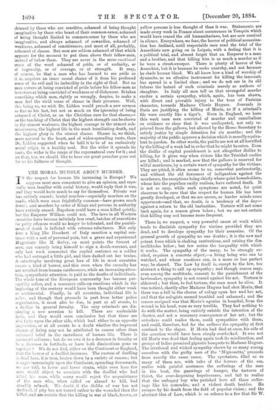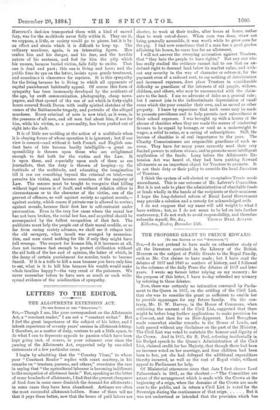THE MORAL MUDDLE ABOUT MURDER.
IS the respect for human life increasing in Europe ? We suppose most men competent to give an opinion, and espe- cially men familiar with social history, would reply that it was, and they would have much to say for themselves. Private war has entirely ceased ; brutal murders—especially murders on the roads, which were once frightfully common—have grown much fewer ; and murders by order of Kings and persons in authority have entirely ceased. Napoleon could have a man killed quietly, but the Emperor William could not. The laws in all Western countries have become infinitely less cruel, batches of executions for petty offences would no longer be tolerated, and the punish- ment of death is inflicted with extreme reluctance. Not only does a King _like Humbert of Italy sanction a capital sen- tence with a sort of personal pain, but a grave and experienced Magistrate like 1sf. Grevy, on most points the firmest of men, can scarcely bring himself to sign a death-warrant, and only last week commuted the capital sentence on a soldier who had outraged a little girl, and then dashed out her brains. A catastrophe involving great loss of life in most countries rouses a kind of horror, and this even when the casualty has not resulted from human carelessness, while an increasing atten- tion, sympathetic attention, is paid to the deaths of individuals. The whole tone of the European community has become per- ceptibly softer, and a massacre calls-up emotions which in the beginning of the century would have been thought either weak or sentimental. Finally, in all countries, individual life is safer; and though that proceeds in part from better police organisation, it must also be due, in part at all events, to a decline in general ferocity. The very criminals are dis- playing a new aversion to kill. These are undeniable facts, and they would seem conclusive but that there are also facts upon the other side, which lead either to an opposite impression, or at all events to a doubt whether the improved chance of living may not be attributed to causes other than increased belief in the sacredness of human life. There is iucreasel softness ; but do we owe it to a decrease in ferocity or to a decrease in fortitude, or have both diminutions gone on together ? We do not find, either on the Continent or England, that the horror of a duellist increases. The custom of duelling is dead here, it is true, beaten down by a variety of causes ; but it rages increasingly upon the Continent, spreading downwards, we are told, to lower and lower strata, while even here few men would object to associate with the duellist who had killed his man, while many would reject the acquaintance of the man who, when called on abroad to kill, had steadily refused. We doubt if the dislike of war has not declined, if pity has not turned rather to the wounded than the killed, and are certain that the killing in war of black, brown, or
yellow persons is less thought of than it was. Statements are made every week in France about occurrences in Tonquin which would have crazed the old humanitarians, but are now received in silence. Everywhere, we fear, the horror of political assassina- tion has declined, until respectable men read the trial of the Anarchists now going on in Leipsic, with a feeling that it is a political trial, and almost forget that an Emperor is a man and a brother, and that killing him is as much a murder as if he Were a street-sweeper. There is plenty of horror of the Anarchist, but it is because he seeks anarchy, and not because he sheds human blood. We all know how a kind of worship of dynamite, as an effective instrument for killing the innocent, has spread in a limited class ; and we do not see in its old fulness the hatred of such criminals merely as authors of slaughter. In Italy all men tell us that revengeful murder excites a certain sympathy, which, again, has been shown, with direct and provable injury to the tone of Parisian character, towards Madame Clovis Hugues. Journals in Paris are justifying the killing of Morin, as if a criminal's life were exactly like a tiger's. Even in England, we have this week seen men convicted of murder and cannibalism on evidence so clear that it was undisputed, not only re- prieved from the gallows, but allowed by the Home Secretary to satisfy justice by simple detention for six months; and the majority of the public approve a decision which is morally equiva- lent to pardon. In other words, the public are not at all horrified by the killing of a weak lad in order that he might be eaten. Even the dislike of capital punishment is not altogether dislike to killing, for it gives way when rioters like the Trinidad coolies are killed ; and is marked, now that the gallows is reserved for wilful murderers, by a certain want of sympathy for the victims. They are pitied, it often seems to us, somewhat perfunctorily, and without the old fierceness of indignation against the murderers, the exceptions being chiefly where quiet householders, whose fate the populace easily realises, have suffered death. It is not so easy, while such symptoms are noted, for quiet observers to be sure that the respect for human life has been greatly developed, or that we are secure, as harder minds come uppermost—and that, no doubt, is a tendency of the day— against a return to the old barbarities. Torture will not come back again, for a reason given below ; but we are not certain that killing may not become more frequent.
There is; we suspect, a very powerful cause at work which tends to diminish sympathy for victims provided they are dead, and to develope sympathy for their assassins. Of the general growth of sympathy no one doubts ; it is the new and potent force which is shaking institutions, and raising the dim multitudes below ; but few notice the inequality with which it works. The sympathy of the many, to be strongly ex- cited, requires a concrete object,—a living being who can be watched, and whose emotions can, in a more or less perfect way, he shared. The Law by itself is, except to the few, too abstract a thing to call up sympathy ; and though reason may, even among the multitude, consent to the punishment of the lawbreaker, sympathy is not roused against his act. Torture is abhorred ; but then, to feel torture, the man must be alive. It was noticed, shortly after Madame Hugues had shot Morin, that there was a lull in the chorus of eulogy upon her and her act, and that the eulogists seemed troubled and ashamed ; and the reason assigned was that Mono's agonies in hospital, from the wound in his head, were so very terrible. They had nothing to do with the matter, being entirely outside the intention of the shooter, and not a necessary consequence of her act; but the onlookers could realise them, could sympathise with them, and could, therefore, feel for the sufferer the sympathy at first confined to the slayer. If Morin had died at once, his side of the question would have been simply overlooked. It was not till Morin was dead that feeling again took its misdirection, and groups of ladies promised gigantic bouquets to Madame Hugues. The irrational and wicked sympathy shown by so many among ourselves with the guilty men of the Mignonette,' proceeds from exactly the same cause. The spectators, filled as so many of them are, with tales of the horrors of the sea, realise with painful acuteness the sufferings of the men in the boat, the gnawings of hunger, the tortures of thirst, the ever-deepening hopelessness, and fail to realise that the unhappy boy who perished bore all these suffer- ings like his comrades,' and a violent death besides. He escapes by his death from the field of popular vision ; and the abstract idea of Law, which is so solemn to a few that Sir W. Harcourt's decision transported them with a kind of sacred fury, was for the multitude never fully within it. They see it, we suppose, a little, or society would go to pieces, but it is by an effort and strain which it is difficult to keep up. The ordinary murderer, again, is an interesting figure. Men realise him and his danger, and his fear, and the terrible nature of his sentence, and feel for him the pity which his unseen, because buried victim, fails fully to excite. That one is dead and past ; this one is living and here; and the public fixes its eye on the latter, insists upon gentle treatment, and sometimes is clamorous for reprieve. It is this sympathy for the living because he is living to which all opponents of capital punishment habitually appeal. Of course this form of sympathy has been immensely developed by the accidents of the age, by swift communication, photography, cheap news- papers, and that spread of the use of art which in forty-eight hours covered South Devon with really spirited sketches of the scenes of the Babbacombe tragedy, and portraits of the alleged murderer. Every criminal of note is now tried, as it were, in the presence of all men, and all men feel about him, if not for him, while his victim, as a personality, has been pushed out of sight into the dark.
It is of little use scolding at the action of a multitude when it is obeying forces of whose operation it is ignorant ; but if our view is correct—and without it both French and English con- duct have of late become hardly intelligible—a great re- sponsibility is thrown upon those who are enlightened enough to feel both for the victim and the Law. It is upon them, and especially upon such of them as are journalists, that the duty is thrown of keeping - up the fortitude of the multitude, and educating the imagination till it can see something beyond the criminal on trial,—can perceive his victim, and become conscious of the majesty of Law. The masses must be taught to recognise that killing without legal reason is of itself, and without relation either to circumstances or to the character of the victim, one of the gravest of offences, as well against society as against morals,— against society, which ceases if private war is allowed to revive ; against morals, because their first law is self-restraint under provocation. Even in the very few cases where the moral law has not been broken, the social law has, and acquittal should be accompanied by the fullest recognition of that fact. The publicists must help the people out of their moral muddle, or so far from seeing society advance, we shall see it relapse into the old savagery, when insult was avenged by assassina- tion, and men cared nothing for life if only they might have fall revenge. The respect for human life, if it increases at all, does not increase fast enough to protect civilisation without the aid both of the law and of opinion, the latter of which, in the decay of certain punishment for murder, tends to become flaccid. If it is a trifle to kill a man because you have only him to eat, what is it to kill him because his wealth would make whole families happy P—the very creed of the poisoners. We never remember before to have seen so much or such wide- spread evidence of the misdirection of sympathy.







































 Previous page
Previous page